£100m boost for biggest UK hydro scheme in decades
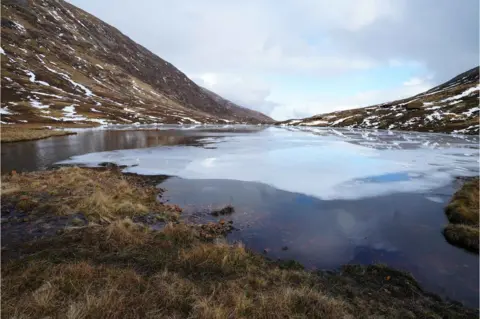 BBC
BBCA giant hydro scheme which would double the UK's ability to store electricity for long periods is taking a leap forward with a £100m investment by SSE.
The proposed 92m-high dam and two reservoirs at Coire Glas in the Highlands would be Britain's biggest hydroelectric project for 40 years.
Scottish ministers approved the 1.5GW pumped storage facility in 2020.
But power giant SSE wants assurances from the UK government before finally signing it off.
A spokesperson for the Department for Energy Security and Net Zero said it was "committed to supporting the low carbon hydro sector, including hydro storage".
Perth-based SSE says the £1.5bn scheme would help tackle climate change and improve UK energy security.
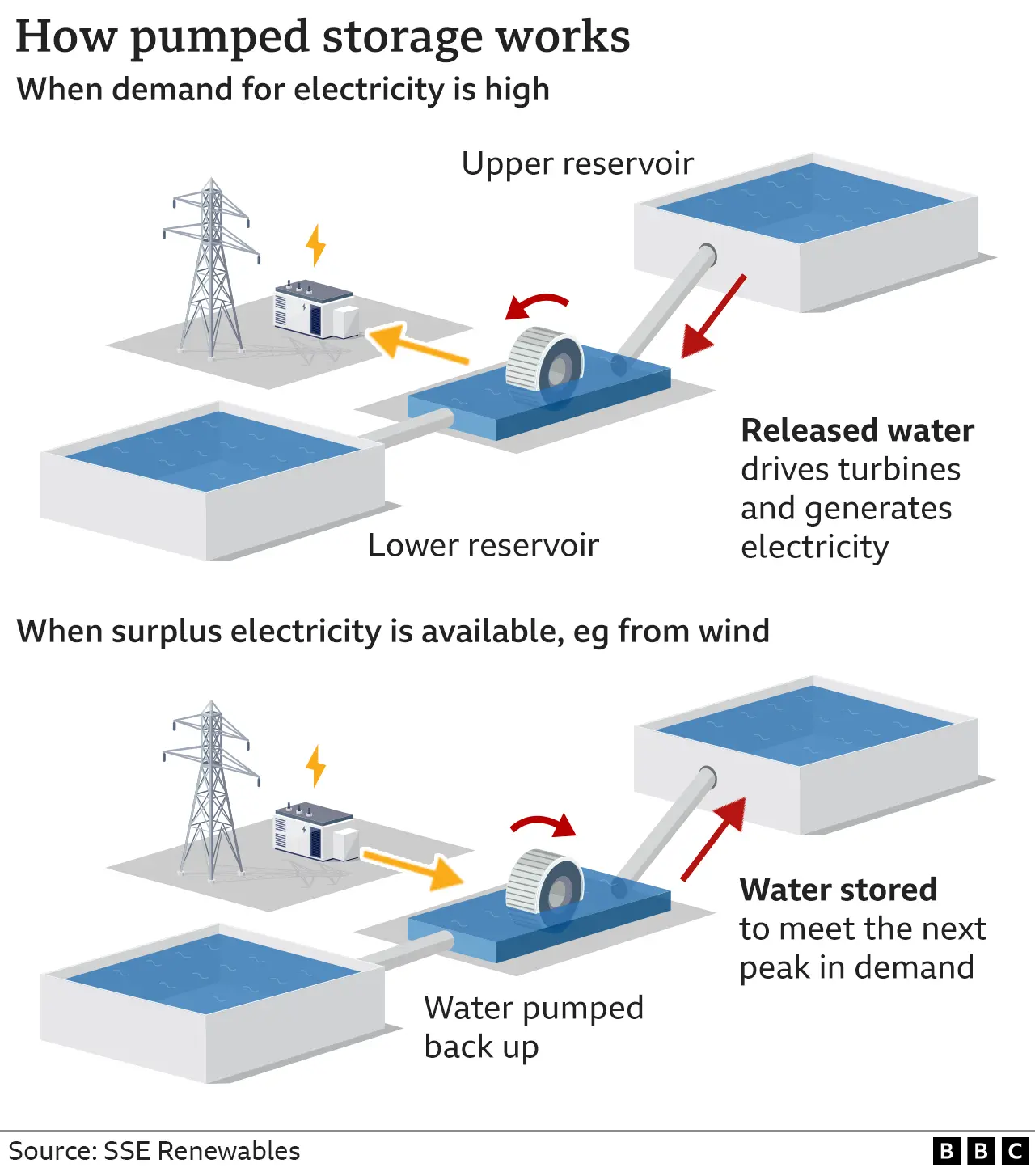
The concept of Coire Glas is simple. It involves two reservoirs at different heights in the Great Glen, the geological fault which slices through Scotland between Inverness and Fort William.
When power is plentiful and cheap, water would be pumped 500 metres uphill for storage in an upper reservoir with the capacity of 11,000 Olympic-sized swimming pools.
When supply is tight and prices high, it would be released, using gravity to generate electricity by spinning four turbines way below on the banks of Loch Lochy, before flowing into the lower reservoir.
By storing electricity generated in windy or sunny weather for use on cold, still or dark days, Coire Glas could help smooth the transition from oil, gas and coal to more sustainable but intermittent sources of energy such as wind and solar.
"We believe strongly it could play a huge role in enabling a decarbonised energy system," said Finlay McCutcheon, SSE's director of onshore renewables.
Keith Bell, professor of future power systems at Strathclyde University, said the proposed scheme would also help with another policy objective: reducing the UK's reliance on imported gas, a challenge given added urgency by the invasion of Ukraine last year by the world's largest gas exporter, Russia.
However, Prof Bell injected a note of caution, saying: "We need a lot more energy storage capacity to get rid of fossil fuels completely... probably 10 to 50 times greater even than the capacity of Coire Glas."
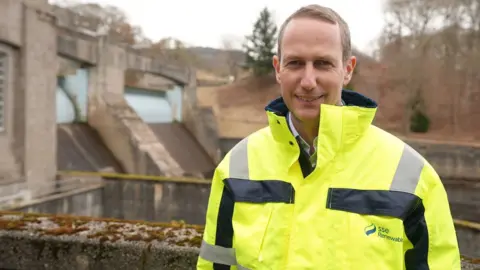
Nonetheless it would still be the UK's largest hydro scheme since the "Electric Mountain" project was completed at Dinorwig in Snowdonia in 1984, and one of the biggest-ever engineering projects in the Highlands, creating up to 500 construction jobs at its peak.
Debate about the pace of the energy transition has featured in the current campaign for the SNP leadership after outgoing First Minister Nicola Sturgeon expressed concern about new North Sea drilling in the context of meeting Scotland's target of net zero greenhouse gas emissions by 2045.
Mr McCutcheon, of SSE, insisted there was a clear case for the UK government to support a strategic expansion in hydro capacity.
The firm's existing assets had been "absolutely critical" in keeping the lights on during a "full-blown energy crisis" in the UK and Europe this winter, he said.
Despite mild weather, "our existing pumped storage - Foyers on the shores of Loch Ness - has never been used so intensely," Mr McCutcheon added.
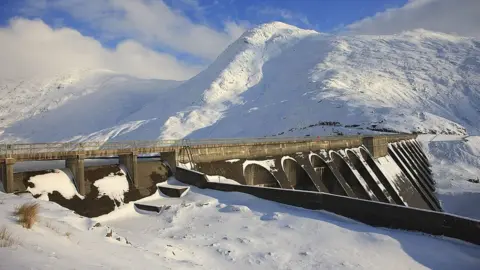 Getty Images
Getty ImagesScotland's only other pumped storage scheme, operated by Drax Group, is housed within a giant artificial cavern inside Ben Cruachan on the shores of Loch Awe in Argyll.
The North Yorkshire-based company plans to more than double the generating capacity of its facility, nicknamed Hollow Mountain, to more than 1GW, with the construction of a new underground power station.
But both Drax and SSE have been reluctant to press ahead without assurances from Whitehall.
"SSE needs clarity around how the UK government is going to support projects like Coire Glas," Mr McCutcheon explained.
"It was a key element of their energy security strategy last year, but we need to see how that's going to work in practice."
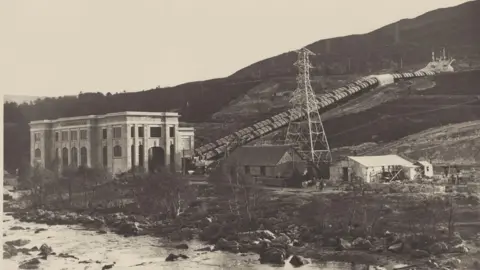 SSE Renewables Archive
SSE Renewables ArchiveHe added: "It doesn't require subsidy but they are enormous investments."
Specifically, SSE would like a commitment to a revenue stabilisation mechanism and more assurances about how the regulated energy market would reward low carbon power generation.
Prof Bell of Strathclyde University said answers were urgently needed by industry, pointing out that the Climate Change Committee, which advises the UK and devolved governments, had published a report this month asking ministers for greater clarity.
The Department for Energy Security and Net Zero spokesperson accepted that hydro would be "critical to delivering greater energy security and independence, economic growth, and our net zero ambitions".
"Already we are supporting up to 480,000 well-paid green jobs, and leveraging up to £100bn of private investment in low-carbon technologies including storage by 2030. This will bolster our energy security and help ensure we bring down wholesale electricity prices to among the lowest in Europe," they added.
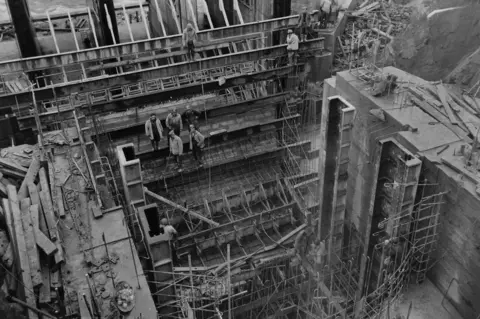 SSE Renewables Archive
SSE Renewables ArchiveSSE says it hopes to make a final investment decision next year. If it goes ahead, completion is expected in 2031.
When running, Coire Glas could reach full generating capacity in under 60 seconds, providing rapid flexibility in the case of a loss of power elsewhere on the national grid.
Alternatively, operating at a more sustainable level, it could power three million homes for up to 24 hours.
The £100m outlay announced by the FTSE 100 company will be used for exploratory work, which includes boring a tunnel four metres wide for about 1km into the hillside to assess the geology of the site.
The investment in Coire Glas comes on the 80th anniversary of the Hydro Electric Development (Scotland) Act 1943, which nationalised the industry and kick-started the creation of more than 50 dams.
The visionary Labour politician Tom Johnston was the driving force behind the expansion, which brought power and jobs to the glens, dramatically improving life in rural Scotland in the years after the war.


It's amazing how this old technology is suddenly becoming necessary again - but for very different reasons.
Pumped hydro schemes were once vital when we all demanded electricity at the same time.
The moment when Dirty Den served divorce papers on his wife Angie during the 1986 Christmas Day episode of Eastenders was watched by 30 million people.
Most of them needed a calming cup of tea when the credits rolled.
All those kettles created a phenomenal demand for electricity, and that's when the sluice gates opened on our pumped hydro plants.
Changing TV habits mean that doesn't happen as often now, and it's the peaks and troughs of supply - rather than demand - which this sort of technology will resolve.
In 15 years, when we're tucked up in bed on a windy night, it'll provide somewhere for all that excess power to go so that it can be used when we wake up.
CORRECTION: An earlier version of this article said that a giant hydro scheme which would double the UK's ability to store energy for long periods was taking a leap forward with a £100m investment by SSE. We should have said that the scheme would double the UK's ability to store electricity, not energy. The article has been amended.
